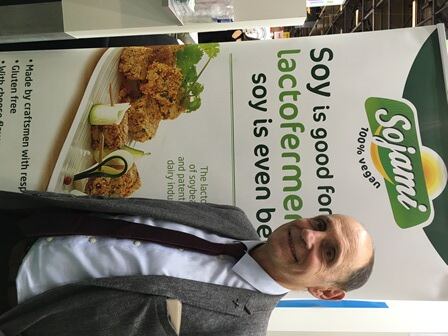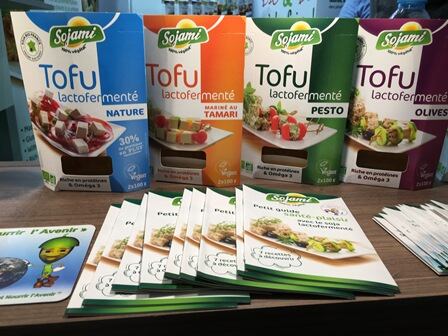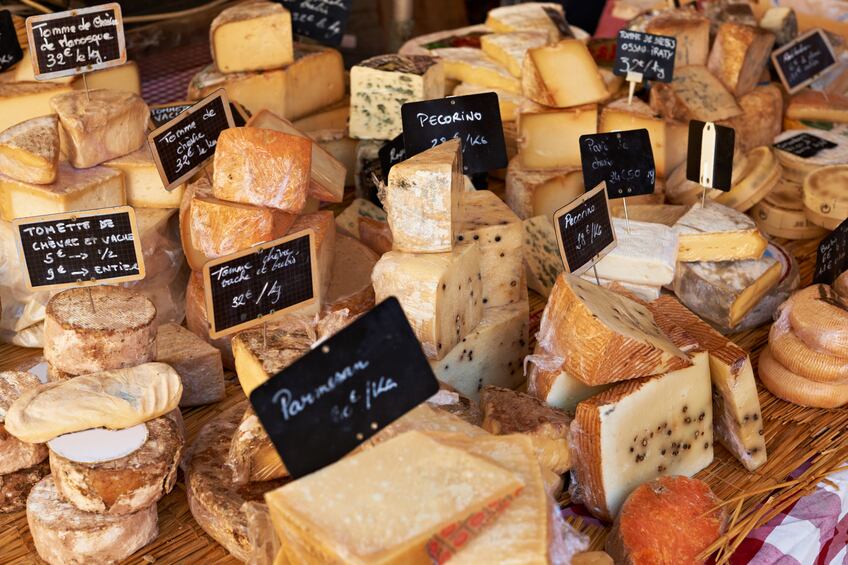The company’s founder and CEO, Professor Jean-James Garreau, had the idea to make a plant-based cheese when watching his parents, who were farmers, make their own goats’ cheese. The idea took him to Bordeaux University where he researched the right probiotic strains to trigger lacto-fermentation of soy milk, and in 1996 he patented the process.
His idea landed him a food innovation prize at Agen’s Agropole and Garreau quit his work as a full-time researcher in human ecology and responsible food systems to set up Sojami, although he still occasionally teaches at university.
Classic French cheese-making technology
“The basic idea was simply to apply the classic French cheese technology – so we’re talking about fermentation, straining, maturing – and apply them to soya milk,” he told Foodnavigator at SIAL in Paris last week.
“With classic tofu manufacturing you take the milk, heat it to 80 degrees, add nigari – calcium chloride or magnesium chloride – stir slowly – it coagulates. This is a physical or chemical coagulation."
Making tofu in this way takes around 20 minutes but Sojami’s patented process takes two days.
“Our coagulation comes from microorganisms. We have a fermented product that is easily digestible and has not been pasteurised. Soy is good – but lactofermented soy is better,” he added, citing the company's slogan.
“People often think lactofermentation has to be related to milk, but not at all. Lactofermentation means the fermentation of microorganisms that then produce lactic acid. Choucroute [sauerkraut] for instance is an example of lactofermentation, cured sausage and bread as well.”

Free from additives, preservatives and colours, the products are sold in more than 1000 organic shops throughout France under the Sojami brand, which makes
up 70% of its business, while between 14 and 17% are sold in major French supermarkets such as Carrefour, Auchan and LeClerc under the brand name SojaBio.
The rest is exported to Spain, Italy, Belgium, Germany and Canada, and Garreau said he was keen to explore export opportunities to the UK where awareness of vegetarian products is higher than in France.
‘We’re not competing with dairy-based cheese, we’re complementing it’
Strident dairy sector lobbying means that in the EU Sojami cannot call its products plant-based cheese or make on-pack claims such as ‘0% lactose’ or ‘0% cholesterol’, said Garreau.
This year a German court ruled that plant-based cheese analogs are not allowed to be marketed or sold as vegan or vegetarian cheeses.
Garreau does not see his products as a threat to traditional dairy cheese.
“This truly is the same technology as cheese-making, and I see it as a plant-based cheese in the sense that [both] are a result of bacteria,
microorganisms. It’s the same fundamental technique but the substrate is different.

“We’re not saying ‘don’t eat cheese’ and this product is not against cheese, it’s a product that widens the selection of cheese. We have cheese made from goat’s milk, from sheep’s milk, cow’s milk. They don’t compete with each other, they complement each other.
“I’m sure that in 15, 20 or 30 years we will see the development of a plant-based cheese industry as rich and diverse as that of the animal-based industry. We are the pioneers here.”

As well as the lactofermented cheese which is sold in blocks it also uses the lactofermented soy milk to produce ice cream available in lemon, vanilla, mango, chocolate and strawberry flavours; a ‘mayonnaise style’ sauce; and various cheese-style spreads flavoured with pepper, algae, olives, walnuts or herbs.
Sojami sources its soy from regional organic producers located in the south west of France no more than 250km away from its own 1200 m² processing facility in Agen which runs on solar power and collects rain water.
